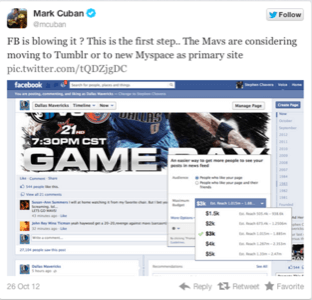
Tech billionaire and Dallas Mavericks owner Mark Cuban says he is fed up with Facebook and will take his business elsewhere. He’s sick of getting hit with huge fees to send messages to his team’s fans and followers.
Two weeks ago Cuban tweeted out a screen grab of an offer he’d received from Facebook. The social network wanted to charge him $3,000 to reach 1 million people. Along with the screen grab, Cuban wrote, “FB is blowing it? This is the first step. The Mavs are considering moving to Tumblr or to new MySpace as primary site.”

Now Cuban tells me he’s doing more than considering a move – he’s doing it. And not just with the Mavs but with the 70 or so companies in which he has invested.
“We are moving far more aggressively into Twitter and reducing any and all emphasis on Facebook,” Cuban says, via email. “We won’t abandon Facebook, we will still use it, but our priority is to add followers that our brands can reach on non-Facebook platforms first.”
Cuban and other corporate Facebook members are howling because new rules on the social network make it harder for brands to reach people without spending big money on sponsored posts.
That’s because in September Facebook changed the algorithm that controls which messages get through to which members. The result is that some brands a sharp dropoff in the reach of their posts – as much as 50% in some cases.
It’s Not A Shakedown – We’re Trying To Fight Spam
Facebook insists it isn’t choking off reach as a way to push brands to spend more on sponsored posts. Facebook uses an algorithm called EdgeRank to determine which people see which posts. EdgeRank uses a lot of factors, including how often your friends log in to Facebook and what settings they choose on their news feeds, the company says.
Facebook constantly tinkers with EdgeRank to make it more effective, says product manager Will Cathcart. The algorithm change in September was a bigger change than usual, Cathcart says, but its goal was simply to cut down on spam in people’s news feed.
Still, Facebook seems more determined than ever to crank up its revenue, especially as its stock price has collapsed more than 50% since its initial public offering earlier this year.
Cuban says the company’s hunger for revenue is backfiring. In an email conversation, excerpted below, he lays out his case for moving away from Facebook:
Why We’re Looking Elsewhere
“It’s not feasible yet, but we have no choice but to continuously evaluate alternatives. We have already pushed more to Twitter. The new Myspace looks promising. And Instagram and Tumbler and others are much more open and are getting more of our attention.
“The big negative for Facebook is that we will no longer push for likes or subscribers because we can’t reach them all. Why would we invest in extending our Facebook audience size if we have to pay to reach them? That’s crazy.
“In many respects it has already blown up on Facebook. Their search for revenue has severely devalued every brand’s following and completely changed the economics of consumer interaction.”
Brands Have Made A Bad Investment
“Brands have invested in getting consumers to like their Facebook page with the presumption that every like is created equal, that the brand can reach the user easily. That is not the case.
“I realize that Facebook has never given 100% user coverage to followers of a brand. However it now appears that to extend beyond minimal reach is going to cost brands more money.
“I think this is a reflection of Facebook searching for more revenue since going public and the more it costs to reach followers on Facebook the lower the value to the brand of being on Facebook.”
I Wouldn’t Buy Facebook Stock
“I haven’t bought [at the current price] and I wouldn’t buy here. I think they have to determine what their business is right now and how they will make money at it. I don’t believe they are clear about either.”
Using Myspace Is Not As Crazy As You Think
“Actually, Myspace is going through a reformatting that looks pretty good. There is a greater than zero chance that it could gather quite a bit of momentum.
“In addition to Myspace, Twitter and Tumblr are both ready, willing and able to support brand activation without holding followers hostage for additional revenue. And in the ironic department, Instagram has the same friction-free reach to followers that Twitter and Tumblr have but Facebook doesn’t.”
Why Brands Feel Betrayed
“Facebook has never allowed 100% reach. I think the disconnect is that not everyone realized that they didnt allow 100% reach. I bet if you asked anyone who has subscribers if their posts reached 100% of their subscribers, they would say yes unless they have seen the dollar box for promoted posts show up.
“I think the same applies to brands as well. Remember most brands don’t have social media departments. They rely on common sense. If someone likes your brand, it seems like common sense to me that you can expect your posts to reach 100% of those that like your brand. Doesn’t it to you?”
Facebook Has A Fundamental Business Model Problem
“And one more point. I get that they want to reduce the speed at which news scrolls off of people’s Facebook pages. The more stuff, the less you see; the less you see, the less you engage. All good points by Facebook.
“But it’s a reflection of overall design and strategy weakness. Again, why would a brand invest in getting likes they can’t reach without paying a premium?”
I’d Rather Pay An Upfront Fee
“The right price is to charge an upfront fee for brands. In the current system there is complete uncertainty on the cost. And even worse, at least for our size brands, you have to deal with the pricing for each posting, which is a time waster.
“I’m just suggesting that a single upfront fee or a monthly fee where there is certainty of cost would allow brands to focus on bringing in consumers to like the brands knowing that they can always reach everyone that likes them. I don’t know what that number should be.
“And let me add, I’m not trying to come off as some Facebook expert. I’m not. I have a bunch of little companies via SharkTank and other investments that use Facebook in the normal course of business. They shouldn’t have go to great lengths to figure out the nuances of Facebook audience reach. That complexity, IMHO, will come back to haunt Facebook.”
Read on: Macromedia’s Marc Canter says, Hell, yeah!
Image courtesy of Reuters.
















